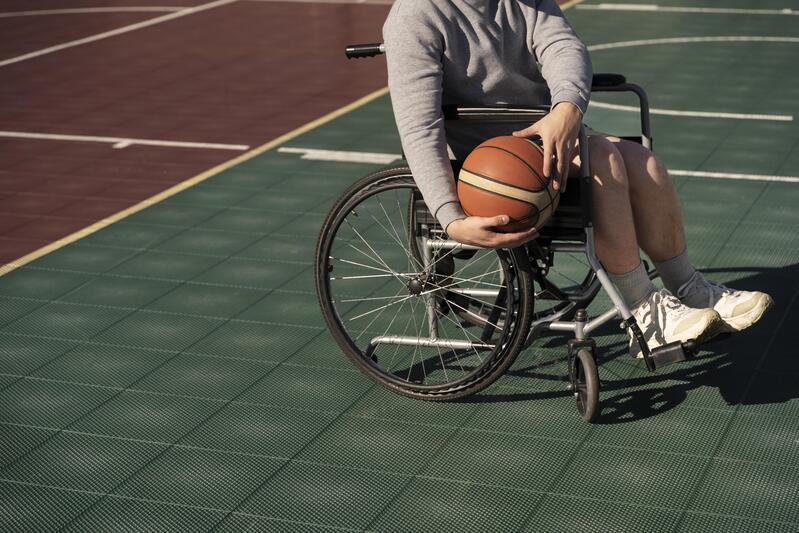Discrimination against people with disabilities still transpires at schools and universities in Indonesia.
Have people with disabilities received adequate education in this country? Has the government opened up access to education as widely as possible for them? The fact remains that discrimination against people with disabilities still often transpires at schools and universities in Indonesia.
Disabled people, according to The Americans with Disabilities Act (2014), are those who suffer from disabilities due to congenital malformation, force majeure, accidents, and so on. Becoming disabled is, predictably, not a recourse. Why? Because most schools provide no special teachers and/or adequate support.
Discrimination in universities occurs as their leaders and academic staff do not reckon and prepare for the fact that several disabled, prospective students possess good academic abilities — sometimes theirs are even better than the able-bodied students. Discriminatory policies towards people with disabilities in university entry requirements are palpable as the state is also putting its responsibilities on the back burner.
According to the 1945 Constitution and Law of the Republic of Indonesia No. 39 of 1999 on Human Rights (especially Article 12), the state’s obligation is to provide education for its citizens without discrimination. Thus, the government should immediately revoke various rules that disregard disabilities. The fact remains that certain study programmes cannot be attended by people with disabilities — not because they are not allowed, but it is because it is deemed impossible by the university in question. When it comes to making decisions about whether or not disabled people are accepted as students, it is rarely done representatively. The same goes for the curriculum, teaching materials, and evaluation models.
Globally speaking, many developed countries have accommodated and provided special facilities for their citizens with disabilities. In the United States, for example, there is a special law to protect people with disabilities called The Americans with Disabilities Act. It refers to the state’s obligation to protect people with disabilities, including their rights to education. The government of the United States has also established a foundation called The Learning Disabilities Association of America to support students with learning disabilities such as dyscalculia and dyslexia.
Various universities in the United States, such as Seattle-based University of Washington, have proven their commitment to protect and assist disabled students very well. To boot, the University of Washington has, since 1978, modified its campus premise into a disabled-friendly environment. It provides, for example, flat and non-hilly road conditions, special shuttle facilities to facilitate the disabled with mobility difficulties, ease of accessing technology both in laboratories and in special libraries that assist blind and deaf people, special parking lots, and academic counselling. In addition, the University of Washington also provides volunteers to help disabled students in writing notes.
More universities in developed nations have been more welcoming towards the disabled, in which access to education is widely offered without discrimination. During my study in Australia, case in point, I discovered that Australian universities had made a significant step in creating an inclusive environment for disabled students. Deakin University, where I studied, provides sign language interpretation services for students with hearing loss — the same facility that is also provided by, just to name a few, the University of Melbourne and the University of New South Wales. In the United States, universities such as Stanford University and Harvard University provide flexible learning arrangements to support students with disabilities.
To be fair, though, several universities in Indonesia have tried to increase accessibility and equality for students with disabilities. The University of Indonesia has employed a disability service unit focusing on various facilities and services to support the disabled. Bandung Institute of Technology (ITB) has dispatched a similar unit responsible for providing support for students with disabilities. Airlangga University and Indonesian Education University (UPI) have implemented a number of policies and programmes to accommodate disabled students as well. Unfortunately, not all campuses in this country have followed their examples.
The situation is also bleak on the primary and middle school levels. In November 2023, Kompas reported that the number of disabled children attending primary and middle schools was still very low. Despite the establishment of inclusive programmes by several primary and middle schools, the availability of the so-called ‘inclusive schools’ and ‘special-ed teachers’ remains, arguably, far from satisfactory. In reality, the most feasible option for disabled children is to attend for-disabled-only schools (also known in Indonesia as Sekolah Luar Biasa or SLB). Socially speaking, the stigma against children with disabilities remains very strong, evidenced by several viral incidents where children with disabilities are mistreated. In September 2022, a case in point, a disabled student in Cirebon Regency, West Java went viral after several high schoolers were documented physically assaulting him in a rice field hut.
The teachers’ attitude is also a vital factor to be considered, in a way that they should have more empathy and patience — in both general schools and for-disabled-only schools. Connecting with the disabled is rarely a piece of cake. Having said that, the commitment that disabled children should receive distinctive attention (and not necessarily an excessive one) needs to be instilled as well. It is crucial not to give the impression that disabled students are to be spoiled, resulting in making them isolated in the classroom. Furthermore, excessive treatment and attention will also limit them from interacting with their peers.
It’s time for everyone to rethink education for people with disabilities. It is very inhumane and, of course, sinful if we continue to let them live with soaring pain following their limited access to education. Education is central to people with disabilities as it allows them to discover the beauty of the world and also, prepares them for various challenges that might await them in the future.
The writer, Donny Syofyan, is a lecturer at the Faculty of Humanities, Andalas University.




